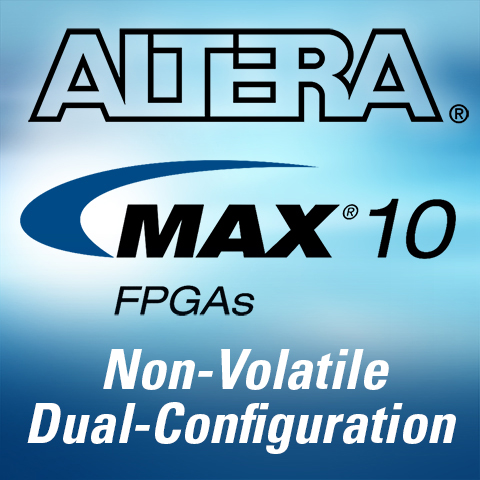MAX 10 FPGAs Deliver Higher System Value through Integration of Dual-configuration Flash, Analog and Embedded Processing Capabilities
Hong Kong, October 1, 2014 – Altera Corporation announced the availability of non-volatile MAX® 10 FPGAs, Altera’s latest addition to its Generation 10 portfolio. Using TSMC’s 55 nm embedded flash process technology, MAX 10 FPGAs revolutionize non-volatile FPGAs by delivering dual-configuration flash, analog and embedded processing capabilities in a small-form-factor, low-cost, instant-on programmable logic device. MAX 10 FPGAs are shipping today and are supported by a broad collection of design solutions that accelerate system development, including Quartus® II software, evaluation kits, design examples, design services through the Altera Design Services Network (DSN), documentation and training. More information can be found at www.altera.com/max10_pr.
“We are very excited about the introduction of Altera’s new MAX 10 FPGAs,” said Katsuhiko Yanagisawa, manager, controller development group, Fuji Xerox Co., Ltd. “These devices offer us a higher level of integration, including ADCs and flash memory with dual-configuration capabilities, required for system management and companion chip functions. These features enable Fuji Xerox to reduce board component count and system cost for our multi-function printers.”
MAX 10 FPGAs provide greater system value to users by reducing overall bill-of-material costs while increasing board reliability.The highly integrated, non-volatile FPGAs provide up to 50 percent board area savings compared to other low-cost FPGAs by integrating into a single chip the following key features:
- Up to 50K logic elements
- Flash memory blocks (user flash and dual-configuration flash)
- Analog-to-digital converters
- Embedded memory and DSP blocks
- DDR3 external memory interfaces
- Embeddedprocessing with soft-core Nios® II processors
- Up to 500 user I/O
- Integrated power regulator
These key features provide higher system-level value to customers by enabling MAX 10 FPGAs to perform severalimportant system functions, such as an instant-onconfiguration, fail-safe upgrades, system monitoring and system control.
Instant-on Architecture for System Bring-up
MAX 10 FPGAs configure inless than 10ms (milliseconds)using on-die flash memory.For system management applications, instant-on allows MAX 10 FPGAs to be the first usable device on a system board and control the bring-up of other board components. In data path applications, instant-on allows MAX 10 FPGAs to provide responsive user interaction when powered on.
Dual Configuration for Fail-safe Upgrades
The on-die flash storage integrated inMAX 10 FPGAs supports dual configuration,allowing two FPGA designs in a single chip. The dual-configuration capability enablesthe device to perform fail-safe upgrades, whereby one flash block is designated for upgrade images while the other block is reserved for a “safe” factory image. This capability enables deployment of systems more quickly, reduces maintenance cost and provides longer operating life.
Analog Blocks for System Monitoring
The analog blocks integrated with MAX 10 FPGAs includeADCs and temperature sensing diodes.The integrated analog functionality allows MAX 10 FPGAs to be used in applications that require system monitoring, such as temperature control and touch-panel human-machine interface control. Integrated analog blocks reduce board complexity, lower latencyand deliver more flexible sample-sequencing, including 2-channel simultaneous sampling.
Embedded Processing For System Control
MAX 10 FPGAs support the integration of Altera’s soft core Nios II embedded processors, providingembedded developers a single-chip,fully configurable, instant-on processor subsystem. Nios II embedded processors integrated in a MAX 10 FPGA allow the device to be used to efficiently manage complex control systems.
Targeting a Broad Range of Applications
MAX 10 FPGAs provide system-level value to many end markets. The device’s integrated functions combined with small package options (as small as 3 mm x 3 mm) make MAX 10 FPGAs an effective solution for space-constrained systems, such as automotive and industrial applications. In advanced communications, compute and storage applications, MAX 10 FPGAs can efficiently manage complex control functions, while performing system configuration, interface bridging, power sequencing and I/O expansion.
“MAX 10 FPGAs address a broad market need to save space, cost and power by integrating more capabilities into a single device,” said Patrick Dorsey, senior director of product marketing at Altera. “Hundreds of customers in the early access program have already realized the benefits of combining embedded flash technology with programmable logic, analog, DSP and microprocessor capabilities and now all customers have access to MAX 10 devices, boards, IP and software.”
Altera’s Enpirion Power Solutions Enhance the System Value of MAX 10 FPGAs
The total system value MAX 10 FPGAs offer in the areas of integration and package size are greatly enhanced when used alongside Altera’s Enpirion power devices. Enpirion power products are highly integrated solutions that simplify board design and reduce BOM (bill-of-material) costs. Altera provides fully validated Enpirion power reference designs optimized for use with MAX 10 FPGAs, lowering design risk and simplifying board design.
Availability
MAX 10 FPGAs are available today. MAX 10 FPGAs are offered in commercial, industrial and automotive (AEC-Q100) temperature grades. Customers can kick start their MAX 10 project by purchasing evaluation kits, downloading design examples, reading product documentationand downloading free MAX 10 FPGA development software, all available on Altera’s website. MAX 10 FPGA evaluation kits are available today for as low as $30. For additional information, visit www.altera.com/max10.







